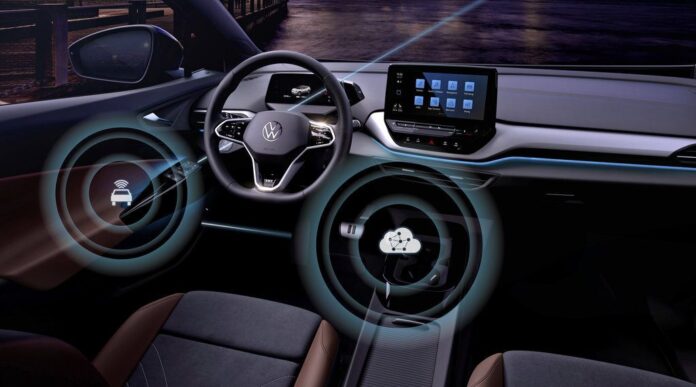Volkswagen-owned automotive software company CARIAD has appointed Franco-Italian semiconductor manufacturer STMicroelectronics (ST) to develop a system-on-chip (SoC) for a new line of Volkswagen vehicles based on the CARIAD software platform. At the same time, the parties “are moving to agree” that silicon contract manufacturer Taiwan Semiconductor Manufacturing Company (TSMC) handles wafer production for the ST SoCs.
And more; CARIAD has said it will enter into direct relationships with tier-two and tier-three semiconductor suppliers on behalf of Volkswagen for the first time. The move will secure chip supplies for the German automotive giant “years in advance”, said a press statement. It is unclear whether CARIAD’s appointment of ST goes against its recent notice that it will use SoCs from Qualcomm in all Volkswagen car brands from the mid-2020s.
But the same kind of messaging is used in the ST release; that the pair is developing “perfectly tailored” hardware for connectivity, energy management, and over-the-air updates to make Volkswagen vehicles “fully software-defined, secure, and future-proof”. The Qualcomm partnership, announced in May, was a “first of its kind” for CARIAD, and a way for its parent to “perfectly match” hardware and software “to bring automated driving” to its customers.
The ST SoC is to go in electronic control units (ECUs) in new Volkswagen vehicles. The new co-developed SoC will complement ST’s Stellar-branded 32-bit automotive microcontroller (MCU) family, said ST, and be used as the “standard chip for CARIAD’s zone architecture”. Tier-one suppliers will be directed to use “only” the new ST SoC and traditional Stellar MCU to ensure all ECU devices – “from MCUs to SoCs” – run on a common software in the future.
Both will be included in CARIAD’s AU1 processor family. The idea is to create a common hardware foundation for various applications, including in the areas of networking, drivetrain, energy management, and comfort electronics. CARIAD will develop only “one basic software” for all ECUs, reducing complexity and accelerating development. Integration of functions in common hardware will also mean a reduction in the total number of ECUs in cars.
A statement said: “The entire AU1 processor family will be powerful enough to easily map future function extensions via over-the-air updates.” The pair will look to extend their work to the co-development of high-performance semiconductors for complex functions, they said. “This is just the first step,” said Lynn Longo, chief tech officer at CARIAD.
Murat Aksel, board member for purchasing at Volkswagen, said: “We are about to launch a groundbreaking new cooperation model for the group. With the planned direct cooperation with ST and TSMC, we are actively shaping our entire semiconductor supply chain. We’re ensuring the production of the exact chips we need for our cars and securing the supply of critical microchips for years to come.”

